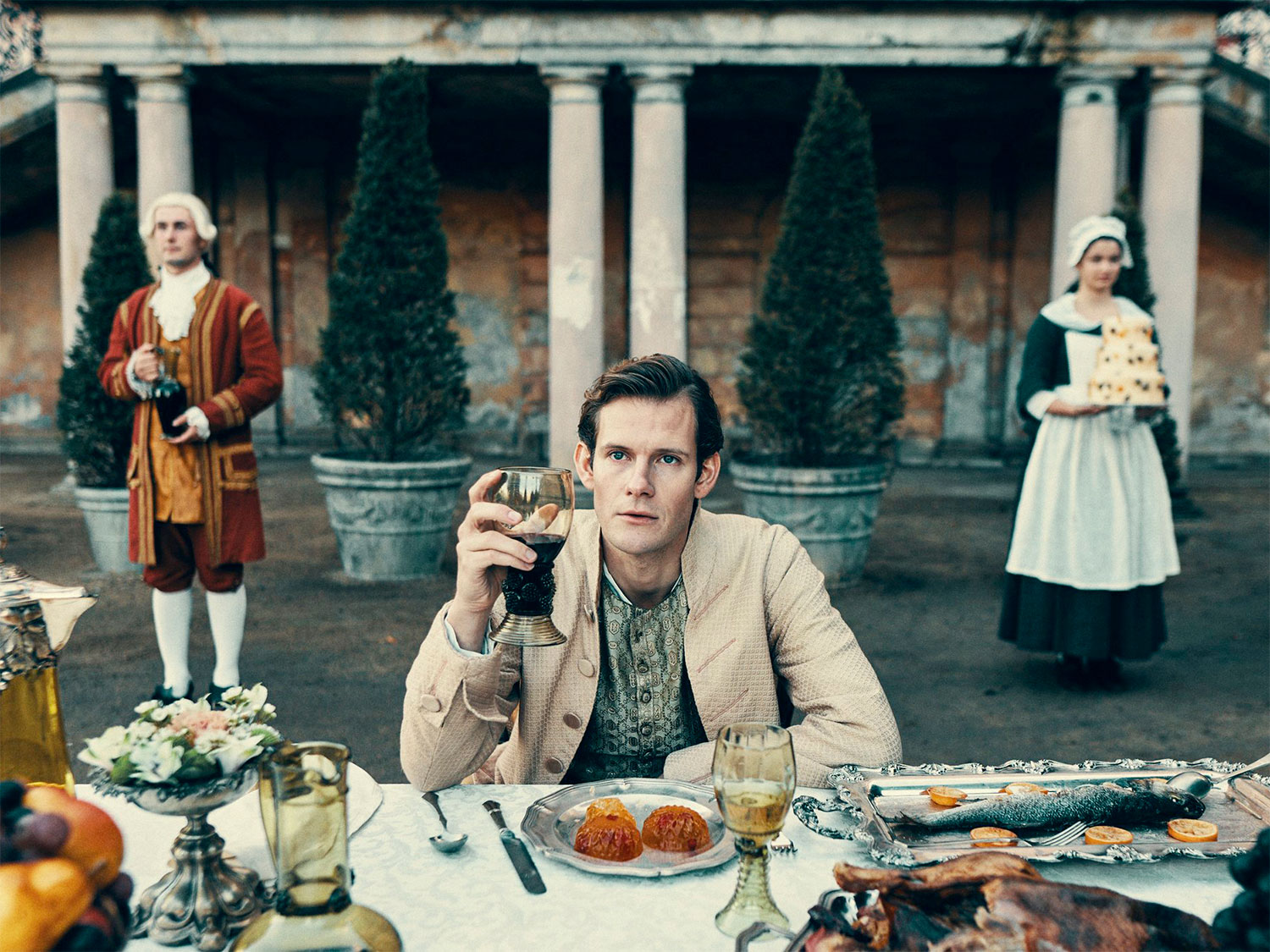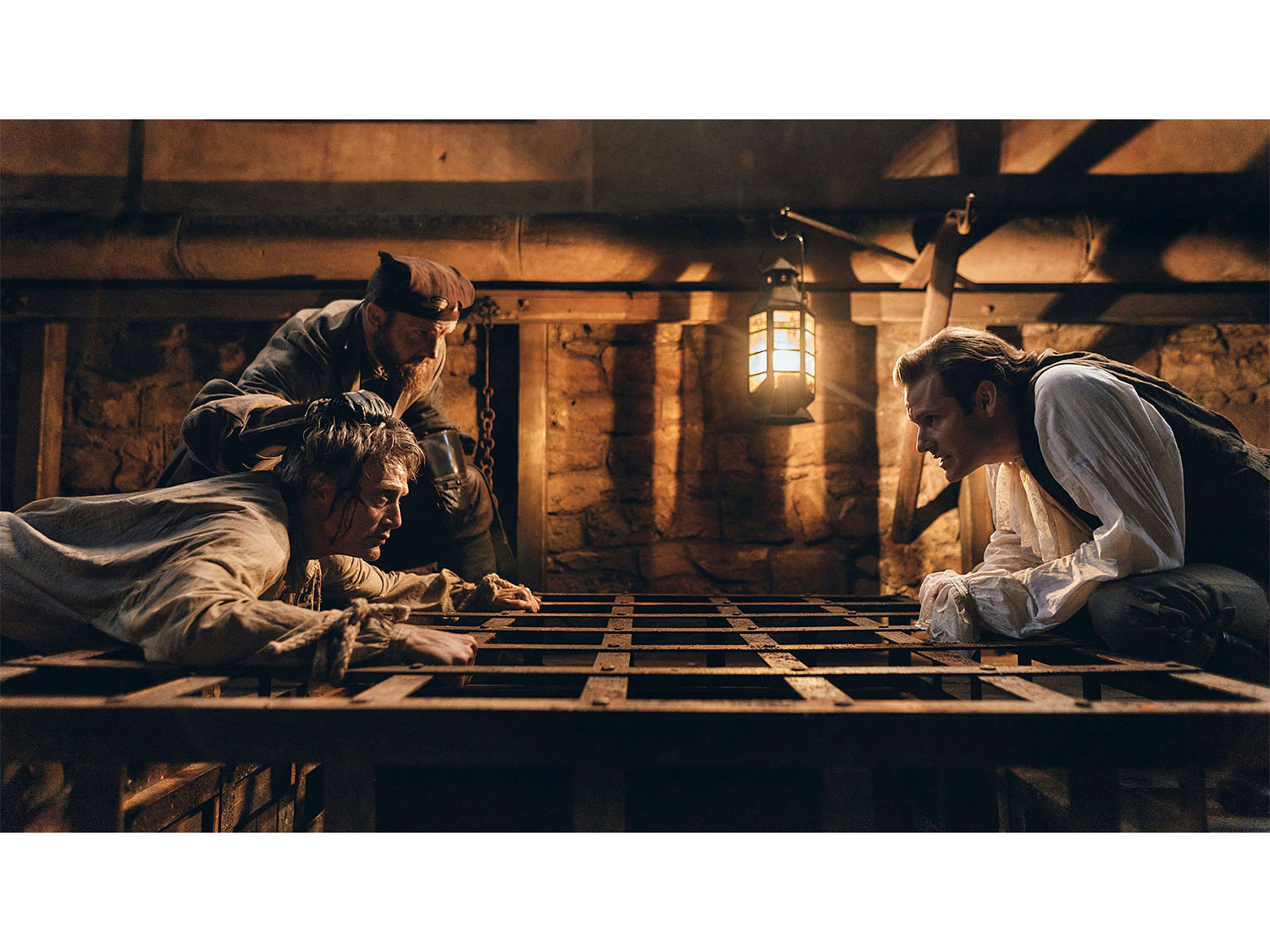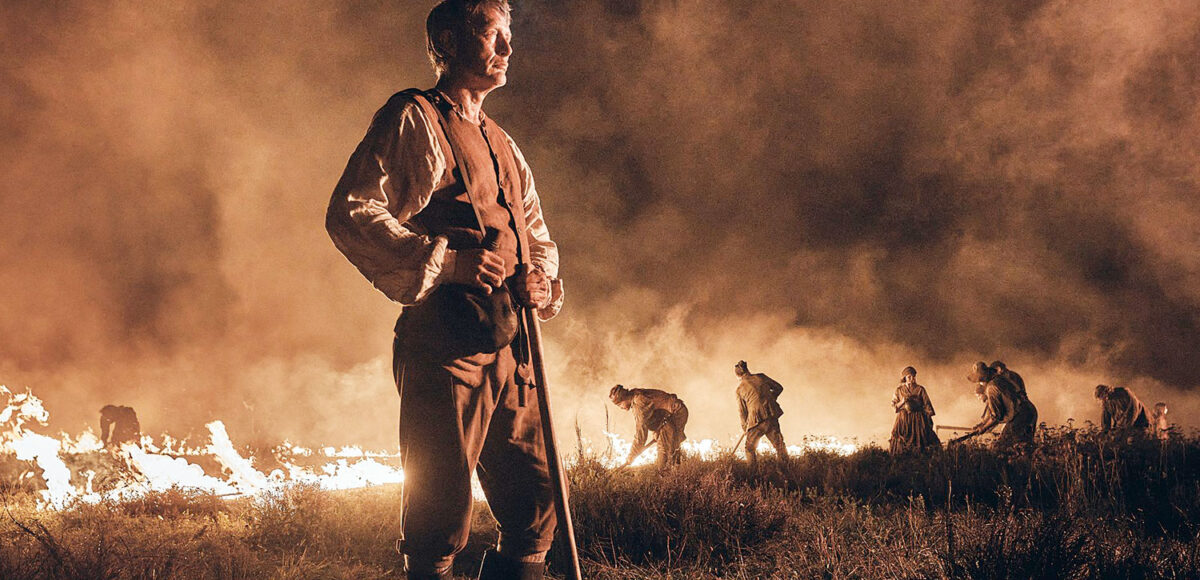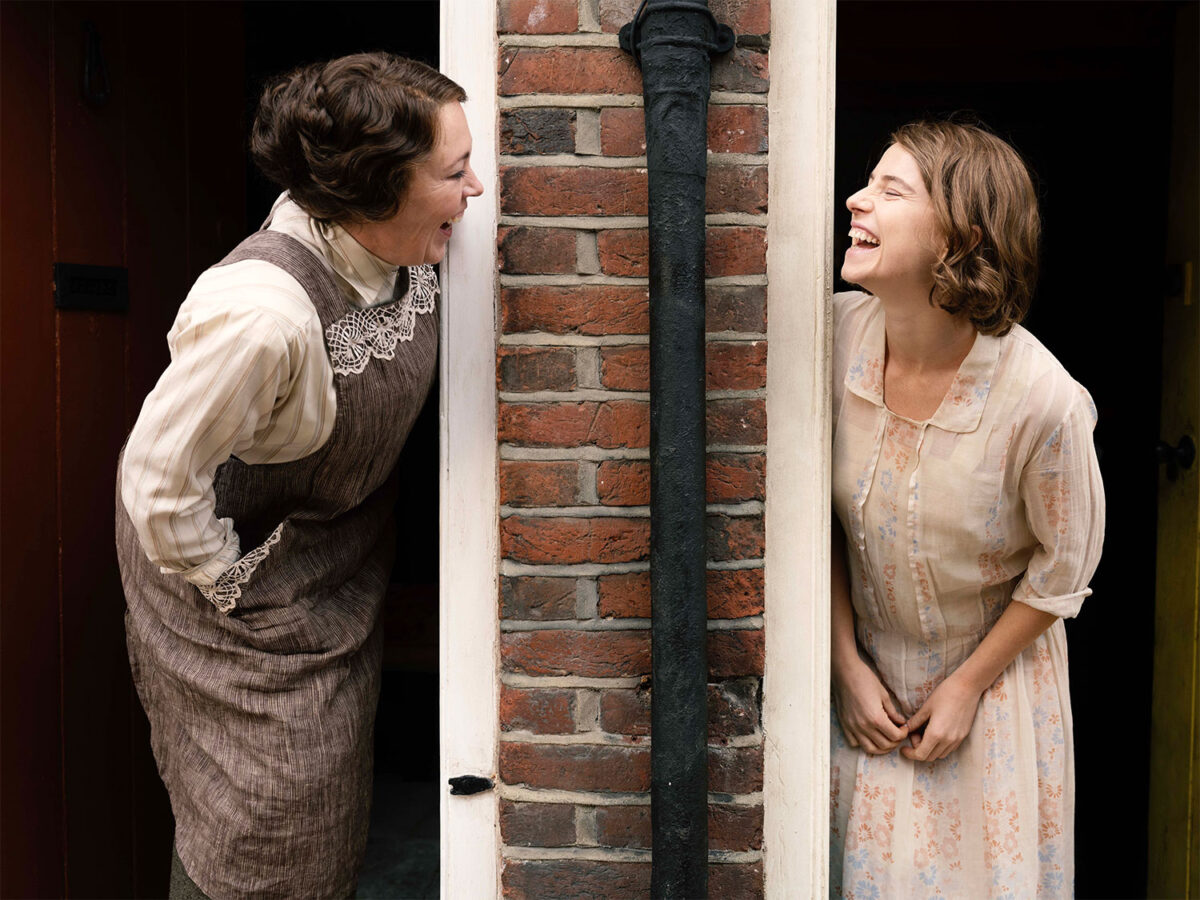Director Nikolaj Arcel dreams in technicolor and sees life on a grand scale, a David Lean film on a minuscule budget. “The Promised Land,” based on the novel “The Captain and Ann Barbara” by Ida Jessen, was adapted for the screen by Anders Thomas Jensen, an Academy Award winner for “In a Better World.” “The Promised Land” is a film of epic proportions from its theme to its execution and is an absolute must-see.
Set in mid-18th century Denmark, Captain Ludvig Kahlen has returned to his homeland from the wars in Germany. A war hero, he has little to show for his service but a dream. Impoverished with a meager pension, he presents himself at court with a proposal. He would like the chance to cultivate some of the barren, unworkable land on the Jutland Heath, a pet project of the king’s. If he succeeds in growing crops on the land and attracts settlers to the area, he requests a royal title, an official deed to the land and a generous stipend. This had, in former days, been precisely what the king had offered to anyone bold enough to try to tackle that barren and forbidding area. But now, instead of an advance of funds or help in any other way, Kahlen will have to go it alone. The court’s cabinet is skeptical but gives an unspoken approval to the end result without any support in advance.
The stalwart Kahlen sets off for the arid heath with its dry soil, rocky undergrowth and forbidding weather. Kahlen, who has nothing, has nothing to lose and continues along his solitary path until he finds a patch of earth that, while not inviting, is not entirely unmanageable. This small patch of land is close to the estate of Frederik de Schinkel (the “de” was his addition to enhance his own aristocratic ambitions). De Schinkel believes himself to be master of all he can see and he sees Kahlen’s project as his. What he is unaware of is that Kahlen is illegally sheltering two of de Schinkel’s former indentured servants, Ann Barbara and Johannes, both hoping to escape the beatings and rapes that were among his characterizing qualities. But it’s not just de Schinkel that works against him, but also a group of Tater, the Danish equivalent of “Travelers” and their lookout, the very young Anmai Mus, a dark-skinned slave to the troop. Refusing to face defeat at the hands of bandits, he negotiates with them to join him in cultivating the land despite the illegality of their employment.
De Schinkel is a merciless and cruel landowner and his assessment of Kahlen is demeaning, although spot on. He recognizes immediately that Kahlen worked for his station in the army, earning the title of Captain after many years due to his work and bravery. He, on the other hand, was accorded the title of General almost immediately because of his family background without having to lift a finger. Kahlen, he surmises, was the illegitimate son of an indentured maid and the aristocratic lord of the manor. His army post was secured by his “father” to remove him from the estate. That he distinguished himself was to his credit but not to his fortune. De Schinkel laughingly assures him that he will never succeed because Kahlen naively believes that the world is logical; that reason rules the universe. Laughing, De Schinkel is amazed at Kahlen’s naivety. The world is chaos, he expounds, and chaos will dominate him no matter how many rules he puts in place.

Photos courtesy of Magnolia Pictures
Kahlen forges ahead despite the machinations against him. De Schinkel was successful in driving off the Tater, leaving Kahlen with only Johannes to help him work the land with Ann Barbara and Anmai Mus, who remains behind, to manage the household. Denmark, at that time, was one of the last Western European countries to abolish serfdom, a practice of indentured servitude that was still thriving on the estates of the Danish aristocracy in 1756 when this story takes place. The punishment for “breaking a contract,” as it was euphemistically called when a serf escaped his master, was torture and death. When Johannes is, inevitably, caught by De Schinkel’s private army, Kahlen is “invited” to watch the punishment, an ode to barbarism, cruelty and arrogance. Ann Barbara, still in hiding on Kahlen’s land, will always remember this act of ruthless savagery and long for retribution.
But Kahlen will not be dissuaded from his dream and continues on. Despite the obstacles in his way, he succeeds in producing a major crop of potatoes, the news of which reaches the court. Soon a contingent of settlers arrives to help work the land. Despite this recognition by the court, Kahlen again finds himself up against an even more dangerous de Schinkel who employs a band of criminals to raid the encampment and kill at will. De Schinkel is proving correct about the chaos of life. But this isn’t life; this is war against an enemy without humanity. Kahlen, knowing that the one who organizes better wins a war of chaos, fights back.
Seeing through the facade of civilization that Kahlen is intent on establishing lies the arrogance and single-mindedness of an individual whose ambitions and desires hide a view of the world that allows for love, compromise and the needs of others. Yes, de Schinkel was right about one thing, life is chaos; it’s painful and often ugly but can also be beautiful and astonishing. Kahlen is relentless; de Schinkel cannot win. But what will be the cost? What do you win if winning is the only goal?
Arcel has, indeed, given us a cinematic epic in terms of scope and story. The cinematographer Rasmus Videbaek has made the barren, rocky, unforgiving earth a character in the film. He paints a picture of desolation so complete that you ache every moment Kahlen’s shovel hits the unyielding earth. The desolation we see resonates long after his camera moves to something else. Never has brown had so many variations, all of them miserable. His close-ups of Kahlen reveal every line and all the toughened leather of skin that has never enjoyed leisure. He and Arcel have a longtime collaboration that seems knowing in the shots he films.

The cast is otherworldly. Melina Hagberg as young Anmai Mus is breathtaking in her range. In her first role, she is audaciously funny and heart-stoppingly sad, depending on the situation, when the camera focuses on her. Amanda Collin is Ann Barbara whose hopes and dreams are on a collision course with Kahlen. Stoic, silent, she uses her eyes to express the hope she feels with Johannes, the occasional disappointment with Kahlen, and the unbridled hatred of de Schinkel. She is, in many ways, the surprising driving force of the narrative.
Handsome Simon Bennebjerg is de Schinkel and you may never see a villain so vile, heartless and ugly. That there is little subtlety to his depravity is not a criticism. He is the very embodiment of everything that was wrong in Denmark at the time. His artistry is in showing the insecurity he feels in a society that will, in a few short years, abandon the Medieval practices on which he thrives. Serfdom, torture, corporal and capital punishment will be abolished and that will leave the de Schinkels of the world without a tether. He is a most delicious blackguard awaiting a comeuppance you long for.
Mads Mikkelsen, Kahlen, is a bona fide international star. Like Max von Sydow, who came to fame in Ingmar Bergman films in the ‘50s, ‘60s and ‘70s, Mikkelsen, his heir apparent, rose to fame in the 2000s. Like von Sydow, Mikkelsen embodies the quiet, strong Scandinavian stoicism made more vulnerable by his ultimate need for the others he’s eschewed. Mikkelsen says very little yet conveys every emotion, thought and action very effectively. Arcel noted that Mikkelsen will often cut dialogue he feels is superfluous to his actions. His high cheekbones and leathered skin speak to a life of pain. His face is our roadmap to understanding his character. His presence is magnetic and Arcel uses it to great advantage. Make sure to see “A Royal Affair,” also starring Mikkelsen and directed by Arcel. It will actually enhance your knowledge of this troubled era of Danish history but also underscore the symbiotic relationship these two artists have developed. Mikkelsen’s performance will be burned into your memory.
This, Denmark’s submission to the International Film category of the Motion Picture Academy, enters a crowded field but will be very competitive. Although not chosen as a finalist, this is a must-see film of consequence that will last beyond this awards season.
“The Promised Land” is one subject with countless meanings.
In Danish with English subtitles.
Opening Feb. 2 at the Laemmle Royal.
Neely Swanson spent most of her professional career in the television industry, almost all of it working for David E. Kelley. In her last full-time position as Executive Vice President of Development, she reviewed writer submissions and targeted content for adaptation. As she has often said, she did book reports for a living. For several years she was a freelance writer for “Written By,” the magazine of the WGA West, and was adjunct faculty at USC in the writing division of the School of Cinematic Arts. Neely has been writing film and television reviews for the “Easy Reader” for more than 10 years. Her past reviews can be read on Rotten Tomatoes where she is a tomato-approved critic.







